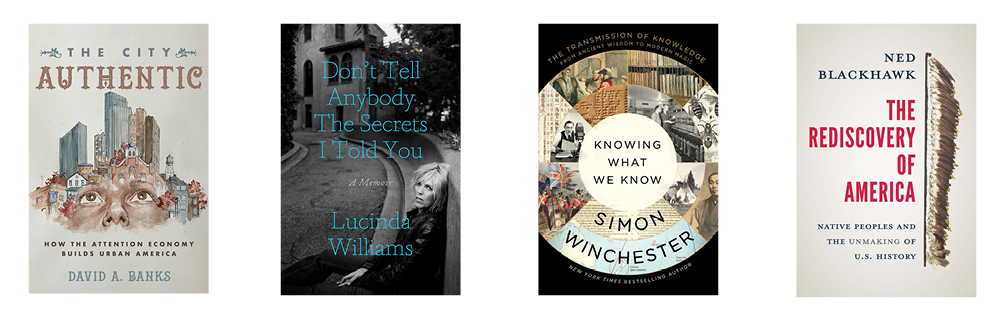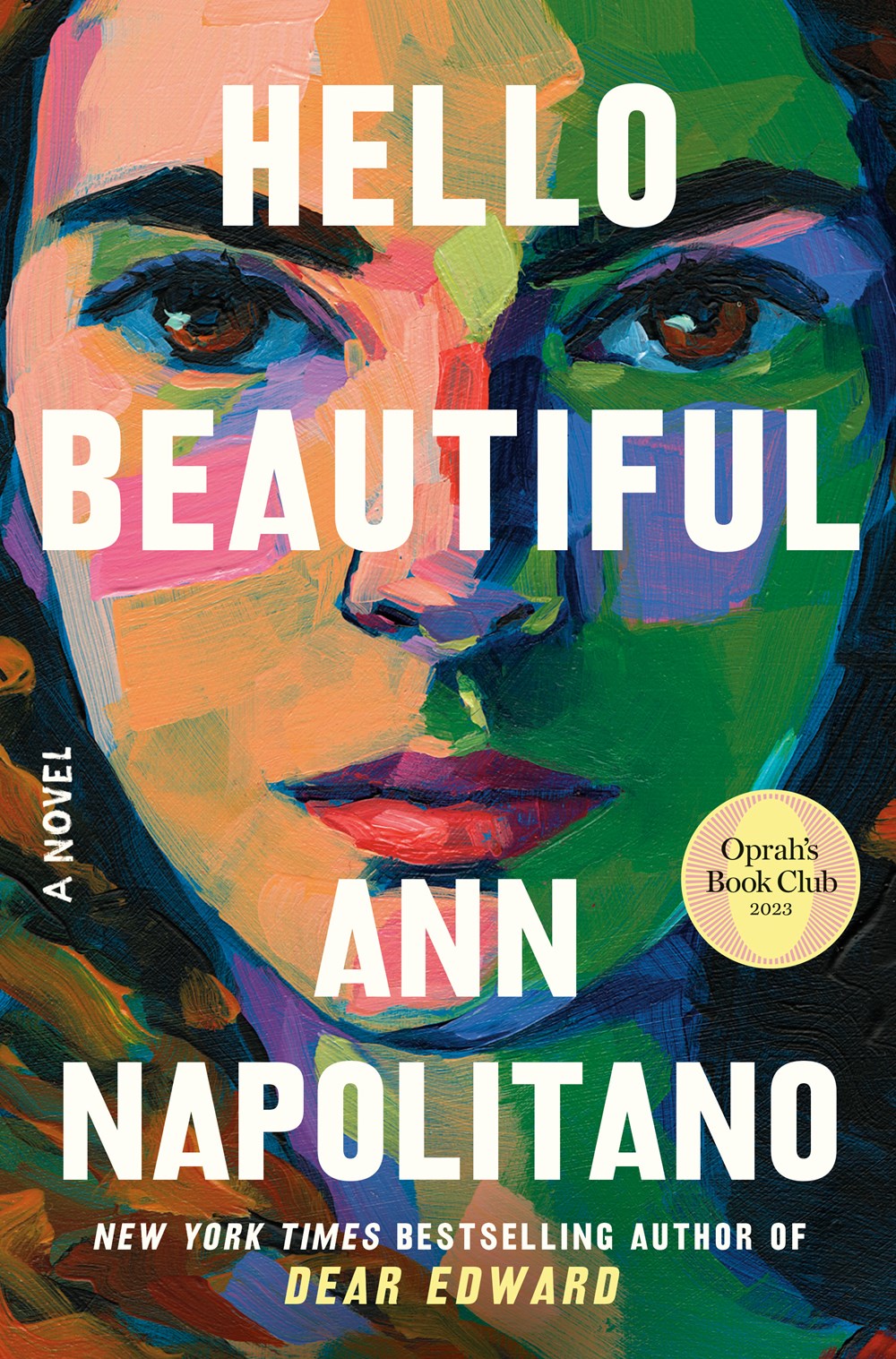New Releases | April 25, 2023
Excellent new books are brought into the world every single week. Here at Porchlight, we track them all and elevate four new releases we are excited about as they hit bookstore shelves on Tuesday morning.
The books are chosen by Porchlight's Managing Director, Sally Haldorson, and the marketing team: Dylan Schleicher, Gabbi Cisneros, and Jasmine Gonzalez. (Book descriptions are provided by the publisher unless otherwise noted.) This week, our choices are:

Jasmine's pick: The City Authentic: How the Attention Economy Builds Urban America by David A. Banks, University of California Press
Cities, like the people that live in them, are subject to the attention economy. In The City Authentic, author David A. Banks shows how cities are transforming themselves to appeal to modern desires for authentic urban living through the attention-grabbing tactics of social media influencers and reality-TV stars.
Blending insightful analysis with pop culture, this engaging study of New York State’s Capital Region is an accessible glimpse into the social phenomena that influence contemporary cities. The rising economic fortunes of cities in the Rust Belt, Banks argues, are due in part to the markers of its previous decay—which translate into signs of urban authenticity on the internet. The City Authentic unpacks the odd connection between digital media and derelict buildings, the consequences of how we think about industry and place, and the political processes that have enabled a new paradigm in urban planning. Mixing urban sociology with media and cultural studies, Banks offers a lively account of how urban life and development are changing in the twenty-first century.
Sally's pick: Don't Tell Anybody the Secrets I Told You: A Memoir by Lucinda Williams, Crown
Lucinda Williams's rise to fame was anything but easy. Raised in a working- class family in the Deep South, she moved from town to town each time her father—a poet, a textbook salesman, a professor, a lover of parties—got a new job, totaling twelve different places by the time she was eighteen. Her mother suffered from severe mental illness and was in and out of hospitals. And when Williams was about a year old she had to have an emergency tracheotomy—an inauspicious start for a singing career. But she was also born a fighter, and she would develop a voice that has captivated millions.
In Don't Tell Anybody the Secrets I Told You, Williams takes readers through the events that shaped her music—from performing for family friends in her living room to singing at local high schools and colleges in Mexico City, to recording her first album with Folkway Records and headlining a sold-out show at Radio City Music Hall. She reveals the inspirations for her unforgettable lyrics, including the doomed love affairs with “poets on motorcycles” and the gothic southern landscapes of the many different towns of her youth, including Macon, Lake Charles, Baton Rouge, and New Orleans. Williams spent years working at health food stores and record stores during the day, so she could play her music at night, and faced record companies who told her that her music was “ not finished,” “too country for rock and too rock for country.” But her fighting spirit persevered, leading to a hard-won success that spans seventeen Grammy nominations and a legacy as one of the greatest and most influential songwriters of our time.
Raw, intimate, and honest, Don't Tell Anybody the Secrets I Told You is an evocative reflection on an extraordinary woman’s life journey.
Dylan's pick: Knowing What We Know: The Transmission of Knowledge: From Ancient Wisdom to Modern Magic by Simon Winchester, Harper
With the advent of the internet, any topic we want to know about is instantly available with the touch of a smartphone button. With so much knowledge at our fingertips, what is there left for our brains to do? At a time when we seem to be stripping all value from the idea of knowing things—no need for math, no need for map-reading, no need for memorization—are we risking our ability to think? As we empty our minds, will we one day be incapable of thoughtfulness?
Addressing these questions, Simon Winchester explores how humans have attained, stored, and disseminated knowledge. Examining such disciplines as education, journalism, encyclopedia creation, museum curation, photography, and broadcasting, he looks at a whole range of knowledge diffusion—from the cuneiform writings of Babylon to the machine-made genius of artificial intelligence, by way of Gutenberg, Google, and Wikipedia to the huge Victorian assemblage of the Mundanaeum, the collection of everything ever known, currently stored in a damp basement in northern Belgium.
Studded with strange and fascinating details, Knowing What We Know is a deep dive into learning and the human mind. Throughout this fascinating tour, Winchester forces us to ponder what rational humans are becoming. What good is all this knowledge if it leads to lack of thought? What is information without wisdom? Does Rene Descartes’s Cogito, ergo sum—“I think therefore I am,” the foundation for human knowledge widely accepted since the Enlightenment—still hold?
And what will the world be like if no one in it is wise?
Gabbi's pick: The Rediscovery of America: Native Peoples and the Unmaking of U.S. History by Ned Blackhawk, Yale University Press
The most enduring feature of U.S. history is the presence of Native Americans, yet most histories focus on Europeans and their descendants. This long practice of ignoring Indigenous history is changing, however, with a new generation of scholars insists that any full American history address the struggle, survival, and resurgence of American Indian nations. Indigenous history is essential to understanding the evolution of modern America.
Ned Blackhawk interweaves five centuries of Native and non‑Native histories, from Spanish colonial exploration to the rise of Native American self-determination in the late twentieth century. In this transformative synthesis he shows that
- European colonization in the 1600s was never a predetermined success;
- Native nations helped shape England’s crisis of empire;
- the first shots of the American Revolution were prompted by Indian affairs in the interior;
- California Indians targeted by federally funded militias were among the first casualties of the Civil War;
-
the Union victory forever recalibrated Native communities across the West;
twentieth-century reservation activists refashioned American law and policy.
Blackhawk’s retelling of U.S. history acknowledges the enduring power, agency, and survival of Indigenous peoples, yielding a truer account of the United States and revealing anew the varied meanings of America.
WHAT WE'VE BEEN READING AT HOME
 "The opening line of Hello Beautiful by Ann Napolitano reads, 'For the first six days of William Waters's life, he was not an only child.' I was immediately hooked. Set primarily in Chicago, this book follows a colorful cast of characters in a narrative reminiscent of Little Women, but with added complexity and darkness. Once you pick this book up, you won't want to put it down."
"The opening line of Hello Beautiful by Ann Napolitano reads, 'For the first six days of William Waters's life, he was not an only child.' I was immediately hooked. Set primarily in Chicago, this book follows a colorful cast of characters in a narrative reminiscent of Little Women, but with added complexity and darkness. Once you pick this book up, you won't want to put it down."
—Jasmine Gonzalez, Managing Editor



